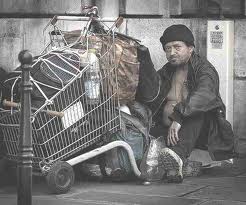One and a Half Billion People Live on Less Than $1.25 Per Day

A new study by the UK’s Overseas Development Institute (ODI) reports that the number of people globally living on less than $1.25 per day is likely to be far higher than the already staggering 1.2 billion estimated by the World Bank.
“There could be as many as a quarter more people living on less than $1.25 a day than current estimates suggest, because they have been missed out of surveys,” the report notes, suggesting that the total number of people living in extreme poverty could be undercounted by as much as 350 million.
If, as the report claims, global poverty figures are “understated by as much as a quarter,” then more than 2.5 billion people, or over a third of the world’s population, survive on less than $2 per day.
The most deprived layers of society—people who are homeless, or are living in dangerous situations that researchers cannot access—are left uncounted by household surveys, which by design are incapable of covering them.
Elizabeth Stuart, lead author of the report, told the World Socialist Web Site that “the poor quality of the data on poverty, child and maternal mortality” are some of the report’s most significant findings.
If one were to define poverty as living on less than $5 per day, over four billion people, that is, two-thirds of the human population, qualify as impoverished, according to World Bank estimates.
Meanwhile the world’s multimillionaires and billionaires, their stock portfolios soaring, are splurging on supercars, yachts and luxury apartments in record numbers. While the monetary policies pursued by the world’s central banks inject unimaginable amounts of wealth into the coffers of a parasitic financial aristocracy, the bulk of humanity struggles to survive amid poverty, austerity and war.
In March, Forbes reported that the combined net worth of the world’s billionaires hit a new high in 2015 of $7.05 trillion. Since 2000, the total wealth of the world’s billionaires has increased eight-fold. The magazine reported, “Despite plunging oil prices and a weakened euro, the ranks of the world’s wealthiest defied global economic turmoil and expanded once again.”
The amount of wealth controlled by the top 1 percent of the population will exceed that owned by the bottom 99 percent by next year, according to the Oxfam charity.
This week, the International Monetary Fund released its semiannual World Economic Outlook, where it warned that there would be no return to the rates of economic growth that prevailed before the 2008 financial crash for an indefinite period.
The IMF’s report further notes that despite record profits and huge amounts of cash being hoarded by major corporations internationally, private investment has plummeted in the six years since the official end of the post-financial-crisis recession. The report documents the single-minded focus of governments, central banks and policy makers in general on the further enrichment of the global financial elite at the expense of the world’s productive forces and the vast bulk of humanity.
The sheer levels of inequality across the globe, expressed in dilapidated infrastructure, the assault on the living standards of workers and youth, and the erosion of democratic rights, themselves inhibit serious studies of poverty, as demonstrated by the ODI’s report.
The ODI study notes that more than 100 countries do not have functioning systems to register births or deaths, making accurate counts of child mortality and maternal mortality impossible. Twenty-six countries have not collected data on child mortality since 2009. According to current estimates, anywhere from 220,000 to 400,000 women died during childbirth in 2014. Fewer than one in five births occur in countries with complete civil registration systems.
Many surveys are outdated, forcing researchers to either extrapolate from old data, or make assumptions about the relations between other data sets. The most up-to-date estimate of people living in extreme poverty was published almost four years ago. Only 28 of 49 countries in sub-Saharan Africa had a household income survey between 2006 and 2013. Botswana’s poverty estimates are based on a household survey from 1993.
Estimations of poverty are further complicated by disagreements over the poverty threshold. Some nongovernmental organizations have set their own national poverty lines. For instance, in Thailand, the official national poverty line is $1.75 per day and the poverty rate is 1.81 percent. However, urban community groups have assessed the poverty line to be $4.74 per day, bumping the country’s poverty rate to nearly half the population at 41.64 percent.
Wars and other violent conflicts have a devastating effect on research of any kind, halting studies, ruining infrastructure, and destroying records. The vast sums of money spent on war dwarf those needed to significantly reduce social misery. The United States alone spent $496 billion on defense last year, while, according to the United Nations Food and Agriculture organization, “the world only needs 30 billion dollars a year to eradicate the scourge of hunger.”
These staggering levels of poverty, inequality and military violence stand as a damning indictment of the capitalist system, the sole aim of which is to enrich the financial oligarchy that dominates society at the expense of the great majority of humanity.

